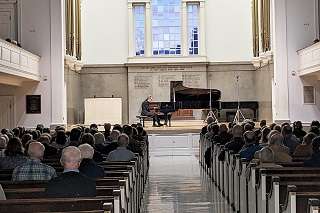|
Back
Pianist Llŷr Williams charms in rare American visit New York
Schenectady (Memorial Chapel, Union College)
11/05/2023 - & October 14 (Woking), November 7 (Montréal), 17 (London), 2023
Béla Bartók: Romanian Folk Dances, Sz. 56 – Piano Sonata, Sz. 80
Frédéric Chopin: Polonaise in F‑sharp minor, Op. 44
Karol Szymanowski: Mazurkas Op. 50
Edvard Grieg: Selections from Lyric Pieces
Peter Warlock: Folk Song Preludes
Isaac Albéniz: Selections from Iberia
Franz Liszt: Hungarian Rhapsody No. 12 in C‑sharp minor
Llŷr Williams (Pianist)

L. Williams (© Thomas Laskowski)
A large, enthusiastic audience gathered in Union College’s Memorial Chapel on November 5 to hear one of the extraordinary pianists of our time, a performer whose work just keeps getting better with every hearing. That pianist is Llŷr Williams.
This was Williams’ third appearance at Union’s Schenectady, N.Y., campus thanks to Capital Region Classical, an organization which presents internationally renowned musicians and emerging artists to audiences in and around Albany. Although celebrated for his interpretations of the giants of piano music (Beethoven, Chopin, et al.), Williams has been taking a more adventurous route in recent years, exploring turf that may be terra incognita to many listeners and possibly more appealing, to new audiences, than the doughty chestnuts of yesteryear. As I heard one audience member enthuse, “How could I resist a program that included both Szymanowski and Peter Warlock!”
On the surface, the two-hour program appeared innocent enough. For those who demand a theme, you could say it was composers’ longing for and celebrating their homelands. But it became apparent from the first selection (six Romanian Folk Dances by Bartók) that much more was in store. Following a robust opening, Williams teased the sweetest lyricism, the most percussive dance rhythms from the score, a fitting warm‑up for the program to follow. Even here, in one of the lightest selections on the bill, the undercurrent of depth that is Williams’ trademark sound was fully evident. The work concluded as bright and sudden as a shooting star.
For those of us who like our Chopin bold and sonorous, Williams’ approach to the Polonaise in F‑sharp minor was breathtaking. The pianist coursed from mere whispers of melodic fragments to an explosion of thunderous exuberance, both hands flying over the keyboard in a tsunami of feeling. The work quickly cools down to a delicate pas de deux and a dreamy section redolent of 19th century romanticism at its languid best. No one, however, can enliven or make sense of the monotonous section Chopin has composed about a third of the way into this work. Thirty‑second notes peck at the ear like a riveter’s hammer. Fortunately, the pain is short‑lived, Chopin comes back to his senses, and Williams is able to deliver spellbinding runs and a stunning peroration. Once again, despite the effusive emotional content, Williams’ playing comes from a place of depth, stillness, and profundity, permeating every utterance with meaning.
From a polonaise, we moved on to mazurkas, colorful Polish dances reinterpreted by Karol Szymanowski and composed in the 1920s. Williams’ versatility as a performer can be heard in the sleek transition from Chopinesque passion to the cool meanderings of Szymanowski through melodies giddy with unexpected accidentals. Equally serendipitous, but bolder, complex, and more forceful is the Bartók Piano Sonata from 1926. In this work, Williams brings us a musical equivalent of Metropolis, the silent film from about the same time which depicted a dehumanized world in which humans are the tools of relentless machines. Unlike the film, however, Williams brings out the bright tones, the pure structure of Bartók’s work, leaving us with a miracle of discovery rather than a portrait of despair. As the sonata ended, it seemed to gather speed from within, like the spinning of a quark.
Following intermission, Williams performed four sentimental selections from Grieg’s Lyric Pieces, a nice contrast to the first half of the program, and five Folk‑Song Preludes reflecting the Celtic sensibility by Peter Warlock (1894‑1930). Warlock’s birth name was Heseltine, and yes, he was interested in the occult. He may be best remembered for his songs, including the wistful five in this set. Williams’ interpretations of these preludes conveyed a touching glimpse of a sadness that would not readily depart. The second prelude sounds a bit like a Scottish folk hymn which has had a second life as, “Morning has broken.” Williams performed each prelude in this collection with tenderness and affection, in his remarks calling Warlock one of Britain’s finest composers of art songs.
Following two selections from Albéniz’s Iberia, “Rondena” and “El Polo”, both delightful for their flamenco sass and gentle wit, the concert ended with Liszt’s Hungarian Rhapsody No. 12. Here, after what must have been an exhausting hour playing demanding selections, Williams seemed to sprint to the finish line with a staggering display of energy. The sounds he drew forth from the Steinway Grand in this marvelous showpiece were so amazing, I had to investigate later to make sure there was not some mechanical contrivance involved (there was not). To borrow a term from our organ‑playing friends, the artist figuratively pulled out all the stops for a brilliant climax to an unforgettable musical afternoon.
Linda Holt
|